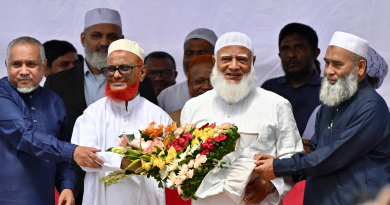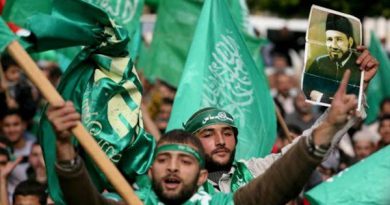OPINION: Qassem Soleimani’s death is a severe blow to Iran’s leadership
by Dr. Majid Rafizadeh
Many people see the blood of innocents — including Syrian, Yemeni, Lebanese, Bahraini and Iraqi children and women — on Soleimani’s hands.
The unexpected death of Iranian Major-General Qassem Soleimani, the head of the elite Quds Force, should be viewed as a severe blow to Iran’s leadership, particularly its military apparatuses.
When it comes to authority in the Islamic Republic, Soleimani was considered Iran’s second man, after Supreme Leader Ayatollah Ali Khamenei. Being a staunchly loyal confidante to Khamenei, Soleimani had great influence over dictating the Iranian regime’s foreign policy.
In fact, Soleimani was not bragging when he famously wrote in a message to US General David Petraeus: “You should know that I … control policy for Iran with respect to Iraq, Lebanon, Gaza and Afghanistan. The ambassador in Baghdad is a Quds Force member. The individual who’s going to replace him is a Quds Force member.”
Soleimani rose from being a construction worker in Kerman to the second most powerful man in the Islamic Republic by exploiting Iran’s 1979 revolution, and by proving his loyalty and determination to advance its revolutionary principles by any means — including brute force or war.
Almost two decades ago, Soleimani was appointed by Iran’s supreme leader to be the head of the Quds Force, a branch of Iran’s Revolutionary Guard Corps (IRGC). The Quds Force is tasked with exporting Iran’s ideological, religious and revolutionary principles beyond the country’s borders.
As the leader of the Quds Force, Soleimani was in charge of extraterritorial operations, including organizing, supporting, training, arming and financing predominantly Shiite militia groups; launching wars directly or indirectly via these proxies; fomenting unrest in other countries to advance Iran’s ideological and hegemonic interests; attacking and invading cities and countries; and assassinating foreign political figures and powerful Iranian dissidents worldwide.
As the leader of the Quds Force, Soleimani was in charge of extraterritorial operations, including organizing, supporting, training, arming and financing predominantly Shiite militia groups.
Under his leadership, the Quds Force was accused in 2011 of failed plans to assassinate Adel Al-Jubeir, then Saudi Arabia’s ambassador to the US, and to bomb the Saudi and Israeli embassies in the US.
An investigation also revealed that the Quds Force was also behind the assassination of Rafiq Hariri, Lebanon’s influential Sunni politician and former prime minister, in 2005.
Soleimani soon became well-known as the Middle East’s deadliest, and Iran’s most dangerous, man. He prioritized offensive tactics and operations over defensive ones, and rejoiced in taking overconfident selfies with his troops and proxies in battlefields in many countries, including Iraq, Syria, Yemen and Lebanon.
He was previously sanctioned by the US, Switzerland and the UN Security Council via Resolution 1747. He was also on America’s Specially Designated Global Terrorists list.
He ruled over roughly 20,000 Quds Force members. However, he could also deploy forces from the IRGC and Basij in case of emergencies. In addition, Soleimani technically commanded fighters from militias that Iran supports and helped create. He also hired fighters from many countries, including Afghanistan, to fight as proxies.
Soleimani’s modus operandi was anchored in creating instability in other countries in order to achieve Tehran’s hegemonic and ideological objectives.
He once declared that the unrest and uprisings in the Middle East and North Africa “provide our (Iran’s) revolution with the greatest opportunities …
Today, Iran’s victory or defeat no longer takes place in Mehran and Khorramshahr. Our boundaries have expanded, and we must witness victory in Egypt, Iraq, Lebanon and Syria. This is the fruit of the Islamic revolution.”
While some Iranian politicians believe their country should wield power via its ideology, Soleimani believed that it should spread its ideology via hard power.
His strategies and military tactics included influencing the sociopolitical and socioeconomic processes of Arab countries via the Quds Force — by supporting and assisting in establishing militias in several countries.
Under his leadership, the Quds Force also infiltrated top security, political, intelligence and military infrastructures in several countries, including Syria and Iraq.
He chose which foreign leaders and politicians to rule, and he had operatives and agents worldwide.
In almost every country and conflict in the region, Soleimani appeared to play a destabilizing role in order to tip the regional balance of power in Iran’s favor.
Many people see the blood of innocents — including Syrian, Yemeni, Lebanese, Bahraini and Iraqi children and women — on Soleimani’s hands. He was considered to be responsible for deaths in many countries in the region and beyond.
Reports suggest Soleimani was killed, along with Iraqi militia commander Abu Mahdi al-Muhandis, on Friday in an airstrike near Baghdad airport.
The Islamic Republic will most likely attempt to retaliate against the US and its allies.
Iran’s supreme leader will also try to appoint someone like Soleimani – an ideologue and revolutionary general who frequently expresses support for, and loyalty to, Iran’s revolutionary Shiite values and the supreme leader – as the head of Quds Force.
In a nutshell, the unexpected death of Qassem Soleimani is a severe blow to Iran’s leadership and its military apparatuses.
Article first appeared on Arab News.
Dr. Majid Rafizadeh is a Harvard-educated Iranian-American political scientist. He is a leading expert on Iran and US foreign policy, a businessman and president of the International American Council. He tweets under @Dr_Rafizadeh.
Disclaimer: Views expressed by writers in this section are their own and do not necessarily reflect Millichronicle’s point-of-view.



